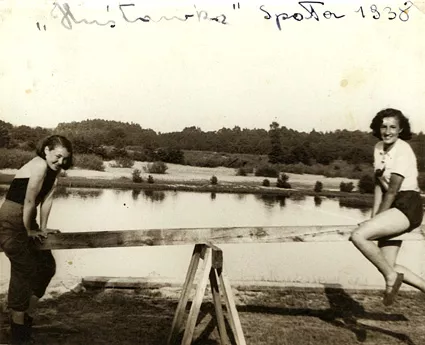Matylda Wyszynska with her freind, Mela Miezes, at summer camp in Spala
This is me with my best friend, Mela Miezes.
In 1938 I went to camp in Spala. This camp was organized by Military Training of Women; I was member of this oganization.
I had four friends since elementary school; we were the five of us, as close as sisters.
We were all Jewish. We also had Polish friends but not that close.
One of us was called Mela Miezes. She had those thick braids, and one night one of her brothers cut off one of those.
During the war she changed her name to Melania Mirska and retained the name afterwards.
Her husband never learned who she was, and her children aren't aware who she was either.
She argued that if she didn't tell him about her ethnic origin before the war or when she was marrying him, i.e. under the occupation in Cracow, then she was afraid to tell him afterwards.
One could think she married for protection and security. They are both dead now.
Another one was Lina - Alina Kupfer, she died. She was my closest friend.
She lived next door. I lived on Leona Sapiehy Street, corner of Gleboka, and she lived on Gleboka Street.
Her parents were Jewish pharmacists, ran their own pharmacy, and had two children, Alina, whom we called Lina, and a son, I don't remember his name, who was a great musical talent.
When my mother died and my father married again, I spent the summer vacations with them and their mother in the Eastern Beskidy mountains south-west of Lwow.
Lina's parents died before the war, first her father, of a heart attack, and then her mother, of cancer. And the children were left alone, they were 15 or 16 years old.
Their mother died, they were left alone, in a large apartment, and we all met there, some boys came, a bit older than us.
As soon as the Germans entered, they took Lina's brother right from the street, to the prison on Lackiego Street, former police buildings turned into a prison; in June 1941, before their evacuation from Lwow, the Soviets murdered the majority of the Polish and Ukrainian prisoners held there.
They were alone, loved each other very much, she went to look for him and never returned.
They killed her too. Their aunt later moved in the apartment.
There were also Tamara and Irka, Irena Weizberg, married name Herz. They lived next door and I was virtually raised in their home.
I called their mother 'mama' when my mother died. They were three sisters and a mother.
The mother was called Klara Weizberg, Tamara was called Zwerling, after her mother's first husband.
The mother attended the parents' evenings in school on their account but also on mine because Tamara was in the same class with me. Irka was younger.
I didn't know much about Jewish political life, and what I knew came from my friend Lusia Lewental.
She came from the most orthodox home of the five of us, we never visited here at home because it was far away.
She was highly aware politically. She was a Zionist. I think her whole home was like that.
She told us about Palestine, about the political parties. But we listened with only half an ear.
We somehow weren't interested in all that. Lusia was killed immediately, didn't even go to the ghetto, such were her looks.






































